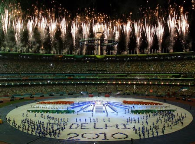 Allegations of corruption in construction and procurement need to be investigated and all those responsible brought to book, says B G Verghese.
Allegations of corruption in construction and procurement need to be investigated and all those responsible brought to book, says B G Verghese. With the Commonwealth Games behind us, the time has come to audit what went right and what went wrong. In the end, much went well, not all.
There was no reason for anything to have gone awry as happened - ticketing, internal security at Games' venues, media coverage, seating protocols. Many stands were empty for a number of events as tickets were not freely available.
Some diplomats and VIPs found their cars stopped at outer barriers, as chauffeurs did not have security clearance, and had to walk considerable distances in poor light without escorts.
Media coverage was limited, especially of the gala opening and major events, with only highlights being screened other than by Doordarshan.
An Indian who travels frequently through Southeast and East Asia reported that CWG exposure was disappointing whether because of monopoly media contracts or for other reasons.
The Indian media seemed studiedly oblivious of other participant countries. The focus was not on the Games but obsessively on India. Some sports federation officials were boorish. And there was an embarrassing seating foul-up on the opening night.
The Indian sportsmen and women did the country proud. New icons stepped on the medal stands, giving a huge boost to hitherto ignored sports and bringing unknown places and communities into the limelight. Haryana showed the way.
The momentum gathered must not be lost, but consolidated and expanded. This will require getting rid of a lot of deadwood in the highly politicised sporting associations that have become sinecures and centres of narrow patronage and self-aggrandisement.
The sports ministry too needs reorganisation under a younger minister.
After delays and some glitches, the infrastructure proved to be good and in some cases even superior to comparable Games' venues abroad. The Games Village ultimately won praise and the catering, cultural extravaganzas and shopping were commended.
The opening and closing ceremonies were colourful but too long. Whether for reasons of dengue or terrorist alarms, which were overly exaggerated, fewer visitors than expected came to Delhi. Hotels and new B&B family establishments experienced low occupancy.
The Capital was certainly spruced up, though there are probably lessons to be learned about traffic management despite school buses and industrial vehicles being taken off the road.
The city will now enjoy the lasting benefit of the infrastructure created the extended metro, wider roads, flyovers, a new power station, a spanking new airport and so on.
These would have come in due course but were expedited on account of the Games. The stadia and sports facilities created must now be used as national sports assets for training and events, with subsidised travel and accommodation for visiting athletes.
The fixtures and appurtenant works must not be stolen or substituted and flats in the Games Village auctioned - not allotted to family, friends and so-called Games organisers on the cheap - and the receipts credited to a national sports fund to build sports facilities in small town India and endow sports scholarships.
On the debit side, there must be an inquest on the astonishing lack of coordination - symptomatic of a 'chalta hai' work culture and the chaotic manner in which Delhi is administered with multiple, warring authorities whose hallmark is overheads, not achievement.
This is a standing disgrace and must be firmly put right as an urgent matter of governance reform. Contending municipal empires and pocket boroughs must be ended. India cannot afford urban warlordism.
Why was there no infrastructure coordination committee with funding, personnel and a PERT chart to deliver well before time? The spectacle of a so-called Group of Ministers and the cabinet secretary scurrying about at the last minute did the country's image no good.
The rains did play havoc but this cannot extenuate lack of forward planning that repeatedly delayed deadlines. The manner in which all of Delhi was dug up everywhere for everything and nothing - feverishly, frivolously and wastefully - at great cost to citizens, trade and civic and traffic orderliness, displayed monumental incompetence.
Allegations of corruption in construction, procurement and outsourcing need to be investigated and all those responsible, directly and indirectly, brought to book. Commissions of inquiry have become essays in delay and irrelevance.
Simple committees with credible personnel established under administrative orders can do the job within three months. Pleadings that justice cannot be done in under 17 years simply will not wash. Officials and others who do not cooperate must be presumed guilty and removed. No single directive sanction should come in the way of prosecuting such persons.
The Games are over. Now to clean up any and all of the underlying mess and dirt.










